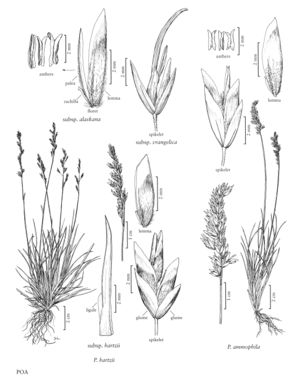Difference between revisions of "Poa hartzii subsp. hartzii"
imported>Volume Importer |
imported>Volume Importer |
||
| Line 40: | Line 40: | ||
|publication year= | |publication year= | ||
|special status= | |special status= | ||
| − | |source xml=https:// | + | |source xml=https://bitbucket.org/aafc-mbb/fna-data-curation/src/2e0870ddd59836b60bcf96646a41e87ea5a5943a/coarse_grained_fna_xml/V24/V24_831.xml |
|subfamily=Poaceae subfam. Pooideae | |subfamily=Poaceae subfam. Pooideae | ||
|tribe=Poaceae tribe Poeae | |tribe=Poaceae tribe Poeae | ||
Revision as of 20:53, 5 November 2020
Culms 10-33 cm. Ligules (1.5)2-7 mm. Panicles 2.5-6 cm, with (1)2(3) branches per node; branches smooth or scabrous. Spikelets 4.8-7.4 mm, lustrous; florets normal; rachilla internodes 0.8-1.5 mm. Upper glumes 3.5-4.5 mm; calluses usually with a crown of hairs, longer hairs 1-2 mm long; lemmas (3.3)3.9-5.4 mm, sparsely hairy, hairs mostly longer than 0.5 mm, apices acute; anthers usually aborted, 0.5-1.5 mm. 2n = 63, 70.
Discussion
Poa hartzii subsp. hartzii is the common subspecies on high arctic islands and in Greenland. It grows at scattered locations on the continental margin, from the Mackenzie River Delta to the Ungava Peninsula, Canada. Outside the Flora region, it is known from Wrangel Island in Russia and from Svalbard, Norway. It is apomictic, setting seed despite rarely forming anthers. Curiously, this subspecies has two different chloroplast genome types within its northern populations, one like P. glauca and one like P. secunda. Robust plants of subsp. hartzii resemble those of subsp. alaskana, but have a tighter habit and poorly developed anthers that are usually aborted.
Selected References
None.
